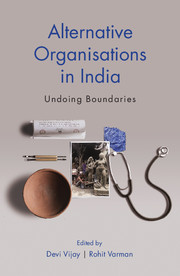Book contents
- Frontmatter
- Dedication
- Contents
- List of Tables and Figures
- Acknowledgements
- Chapter 1 Introduction: Undoing Boundaries
- Chapter 2 Formal and Informal Technologies of Alternative Organisational Spaces within the State: An Analysis of Violence, Wrongdoing and Policing
- Chapter 3 Scripting Alternative Images: Institutions, Practices and Scripts of the Mritshilpis of Kumortuli
- Chapter 4 Shelter for Homeless: Ethnography of Invisibility and Self-exclusion
- Chapter 5 Alternative Spaces of Employment Generation in India: Informal Rules, Structures, and Conflicting Organisational Requirements
- Chapter 6 Shaheed Hospital: Alternative Organisation, Ideology and Social Movement
- Chapter 7 Acting for Change: A Circuits of Power Analysis of a Denotified Nomadic Tribe and Budhan Theater's Struggle for Change
- Chapter 8 Swaraj: An Alternative University
- Chapter 9 Alternative Organisations: Spaces for Contestation
- Contributors
- Index
Chapter 3 - Scripting Alternative Images: Institutions, Practices and Scripts of the Mritshilpis of Kumortuli
Published online by Cambridge University Press: 05 April 2018
- Frontmatter
- Dedication
- Contents
- List of Tables and Figures
- Acknowledgements
- Chapter 1 Introduction: Undoing Boundaries
- Chapter 2 Formal and Informal Technologies of Alternative Organisational Spaces within the State: An Analysis of Violence, Wrongdoing and Policing
- Chapter 3 Scripting Alternative Images: Institutions, Practices and Scripts of the Mritshilpis of Kumortuli
- Chapter 4 Shelter for Homeless: Ethnography of Invisibility and Self-exclusion
- Chapter 5 Alternative Spaces of Employment Generation in India: Informal Rules, Structures, and Conflicting Organisational Requirements
- Chapter 6 Shaheed Hospital: Alternative Organisation, Ideology and Social Movement
- Chapter 7 Acting for Change: A Circuits of Power Analysis of a Denotified Nomadic Tribe and Budhan Theater's Struggle for Change
- Chapter 8 Swaraj: An Alternative University
- Chapter 9 Alternative Organisations: Spaces for Contestation
- Contributors
- Index
Summary
The onset of Durga Puja, a popular religious festival among the Bengalis celebrated during four days in the lunar month of Ashwin (September-October), transforms the city of Kolkata, West Bengal into a grand, if ephemeral, spectacle. The festival weaves around twin narratives of Goddess Durga, consort of Shiva: the popular narrative of the dutiful daughter and benevolent mother visiting her maternal home with her four children (Ganesh, Kartik, Saraswati and Lakshmi) and the mythical story of Durga's fierce form as the ten-armed, victorious demon-slayer. Distinctive to Kolkata, protimas (or images of deities) of Durga and her family are worshipped with much ceremony in the thousands of pandals (make-shift structures usually made of bamboo and coloured cloth) that occupy public spaces across the city. The festival constitutes a cornerstone of Bengali socio-cultural life: an annual event that is welcomed in anticipation and excitement. At the end of the festival, reflecting the ethos of the cyclicality of life, these protimas are immersed in the river Hooghly that flows through Kolkata.
In this chapter, I look behind the scenes of this large-scale dramaturgy to catch a glimpse of the lives of the mritshilpis, or the clay sculptors, who sculpt the protimas that occupy centre-stage for popular consumption during these annual religious festivals. Despite the centrality of these images in arguably the most significant popular culture event of Bengali life, and proliferation of accounts on Durga Puja (for example, Ghosh, 2000; Guha-Thakurta, 2014; McDermott, 2010; Nicholas, 2013), there is a dearth of research on the social world of the mritshilpis. An examination of the ‘ordinary accounts of ordinary adventures’ stands to better explain the social world in which we live (Bourdieu et al.,1999, 624). As I will elaborate in the following sections, mritshilpis’ practices constitute an institutional context with its own particularities and cultural specificities characterised by seasonal work around religious festivals and high uncertainty in terms of orders, flow of labour and raw materials. During peak season, more than half the workforce in an artisanal studio would be constituted of temporary and casual workers. Nevertheless, this occupational practice constitutes one of the oldest, proliferating trades in West Bengal distinguished by an unbroken hereditary tradition (Guha-Thakurta, 2015).
- Type
- Chapter
- Information
- Alternative Organisations in IndiaUndoing Boundaries, pp. 59 - 94Publisher: Cambridge University PressPrint publication year: 2017



